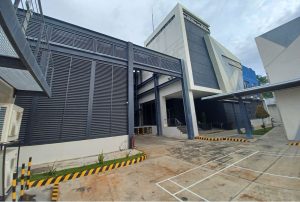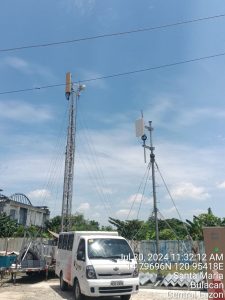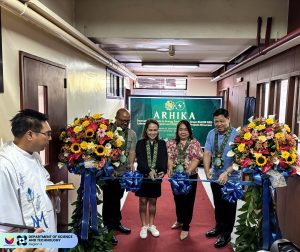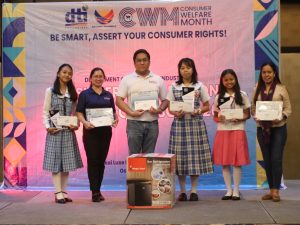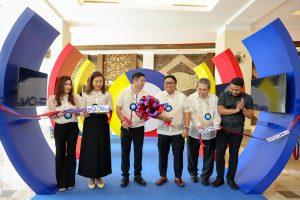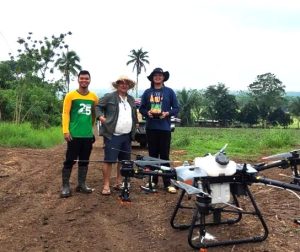
Barangay Paitan, also known as the Rice Granary of Quezon, Bukidnon, is home to a young rice farmer who is committed to using and implementing agricultural innovations and technologies to contribute to the country’s goal of food security and sufficiency.
Peter Emmanuel Balmores Berong, 21, of Balmores Diversified Integrated Farm, is embracing cutting-edge drone technology to introduce a modern approach to rice farming in his community.
Berong grew up on his family’s farm, where he helped with land preparation, sowing fields, and feeding goats and chickens before they adopted new technologies.
“Now that we have embraced new techniques and technologies, my role has evolved. I now operate the drone, make organic fertilizer concoctions, and apply agricultural solutions across the farm. I also designed the farm layout and am currently overseeing the ongoing construction of a new project building, all while actively serving as SK (Sangguniang Kabataan) chairman,” Berong said.
Berong, driven by a deep passion for farming, said he manages his hectic schedule efficiently while sharing his daily activities on the farm.
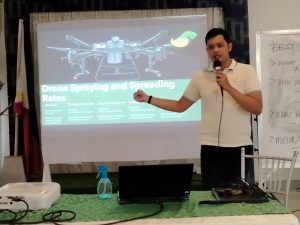
As a third-generation farmer from Paitan, Quezon, Bukidnon, Berong has seen firsthand the challenges that traditional farming methods can pose, from labor-intensive tasks to inefficient resource management. However, everything changed when Berong took part in the Training of Trainers (TOT) Farmers Field School (FFS)—Production of High-quality Inbreed Seed, Seed Certification, and Farm Mechanization—which was organized by the Agricultural Training Institute-Regional Training Center (ATI-RTC).
Nowadays, farmers are increasingly turning to drone technology to optimize their agricultural operations. Berong has already experienced the transformative potential of drone technology in rice production, as their family provides fast and efficient seed spreading and insecticide and herbicide spraying services using the DJI Agricultural Drone AGRAS T30. The drone model has a 30-liter operating tank. It can also cover 25 hectares of rice fields for insecticide and herbicide applications.
“The drones are a huge help for farmers like us because we can save on seedlings and labor costs. Hopefully, the technology is accessible and affordable enough to encourage farmers in our community to utilize it since it can be used for a variety of tasks, including land imaging, surveying, soil monitoring, irrigation monitoring, and targeted spraying,” he said.
Berong added that they are currently trying to convince farmers to adopt new technologies, and the feedback from close friends and family using their agricultural drone has been very positive.
He is a licensed drone user and now regularly performs a variety of tasks using drone technology on their family farm, including precision seeding and fertilizer application, crop health monitoring, and pest management. He takes full advantage of their drone technology, with the supervision of his farmer parents, Peter and Sonia Balmores Berong.
“When it comes to using an agricultural drone for the spray and spread of farm solutions and fertilizers, every application is calculated. For example, for herbicide application, if we have 1 liter of herbicide and we need to apply it to a 1-hectare field area, rest assured that the 1-liter herbicide is precisely applied to the 1-hectare field area,” Berong said.
According to him, the application is precise and efficient, as there is no need to enter the rice field for manual spraying. Applying insecticide also saves time, requiring only seven minutes of flight time. Landowners also reap the benefits of reduced maintenance over large areas, as simultaneous planting and harvesting necessitate only proper irrigation and cleaning of the rice paddies.
As the country grapples with the challenges of feeding a growing population and adapting to the impacts of climate change, Berong’s story serves as a shining example of how innovation and technology can help revolutionize the rice industry.
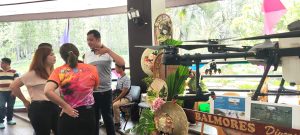
“As a young farmer, I would use my youth to engage more often with our farmers. I would use the knowledge from the training I have attended to convince farmers to be adaptive to changing times. I will also encourage or challenge them to use less input but generate more income. I am now 21 years old, and we are planning to have rice-based products soon like rice coffee, rice barquillos, and much more,” Berong shared.
For the young farmer, the future of rice farming in Quezon, Bukidnon, is bright, and he is determined to be at the forefront of this digital transformation. “I want to inspire young people to put much weight on farming so that someday all the silent heroes—our farmers—will stand with their heads held high, prosperous, dignified, and proud,” he said.
For DJI Agricultural Drone Services, one can contact Berong at 0992-800-3032 or visit Balmores Diversified Integrated Farm. (ATI-10/PIA-10)


